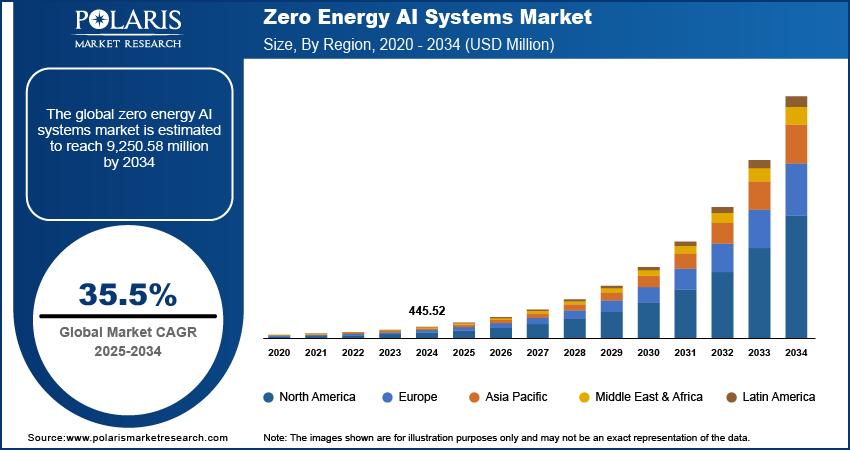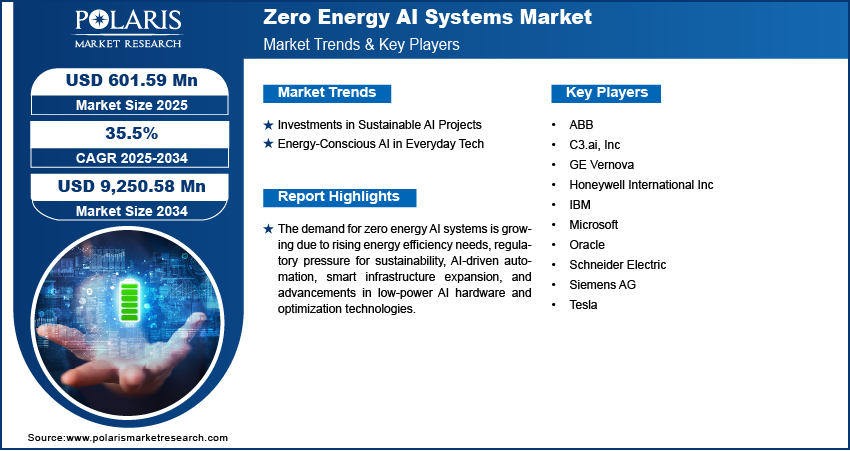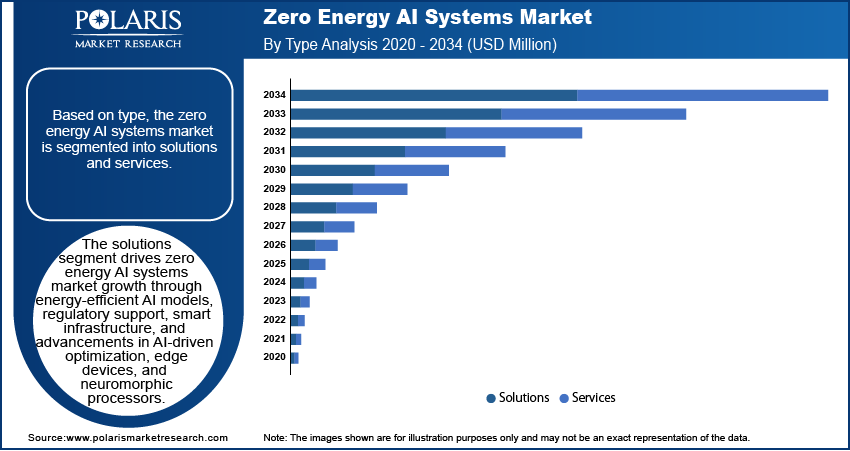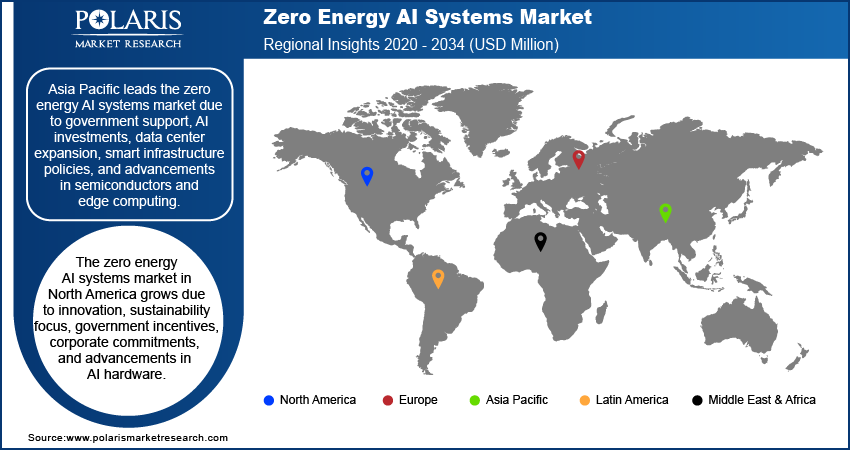
Zero Energy AI Systems Market Size, Share, Trends, Industry Analysis Report: By Type (Solutions and Services), Application, Deployment, End Use, and Region (North America, Europe, Asia Pacific, Latin America, and Middle East & Africa) – Market Forecast 2025–2034
- Published Date:Apr-2025
- Pages: 128
- Format: PDF
- Report ID: PM5508
- Base Year: 2024
- Historical Data: 2020-2023
Zero Energy AI Systems Market Overview
The global zero energy AI systems market size was valued at USD 445.52 million in 2024. The market is projected to grow from USD 601.59 million in 2025 to USD 9,250.58 million by 2034, exhibiting a CAGR of 35.5% during 2025–2034.
Zero energy AI systems are advanced artificial intelligence-driven solutions designed to operate with minimal or no external energy input. These systems leverage energy-efficient algorithms, edge computing, and renewable energy sources to function sustainably. With the rapid adoption of AI across various industries, optimizing energy consumption has emerged as a key priority, driving the zero energy AI systems market expansion. Organizations seek intelligent solutions that reduce operational costs and environmental impact, driving interest in AI systems that require little to no energy for continuous functionality.
The increasing global adoption of artificial intelligence is fueling zero energy AI systems market demand. Businesses integrating AI for automation, data analysis, and decision-making are becoming more conscious of power consumption. The traditional AI models rely on energy-intensive data centers, creating challenges related to cost and sustainability. Zero-energy AI solutions address these concerns by reducing dependency on centralized power sources while maintaining high computational efficiency. This shift aligns with corporate sustainability goals and regulatory frameworks, further accelerating market growth.

To Understand More About this Research: Request a Free Sample Report
Autonomous systems development is another key factor driving zero energy AI systems market expansion. Industries such as transportation, healthcare, and industrial automation require AI-driven autonomous solutions capable of operating independently in diverse environments. Energy-efficient AI systems enable autonomous vehicles, smart sensors, and robotics to function without frequent recharging or an external power supply. The increasing reliance on self-sustaining AI technologies strengthens market demand, positioning zero-energy AI as a critical innovation for the future of intelligent automation.
Zero Energy AI Systems Market Dynamics
Investments in Sustainable AI Projects
Investments in sustainable AI projects are driving the growing demand for zero energy AI systems. Companies and governments are increasingly focusing on AI solutions that minimize energy consumption while maintaining high performance. This shift is creating a significant zero energy AI systems market opportunity as industries seek to balance innovation with sustainability. For instance, in February 2025, the EU launched InvestAI, a USD 218 billion initiative to boost AI development, including USD 22 billion for AI Gigafactories. These Gigafactories will train complex AI models in key fields such as medicine and science, powered by 100,000 next-generation AI chips. As AI models become more advanced, energy-efficient computing is crucial to ensure sustainability without compromising progress.
The rising need for large-scale AI infrastructure highlights the importance of energy-efficient systems. AI developers and investors are exploring opportunities, pushing for breakthrough innovations that align with global sustainability goals while enhancing AI capabilities.
Energy-Conscious AI in Everyday Tech
The increasing integration of AI into daily technology is driving demand for energy-efficient solutions. Energy-conscious AI focuses on reducing power consumption, pushing companies to develop low-power and self-sustaining AI systems. This shift is fueling zero energy AI systems market growth as industries seek sustainable alternatives. Innovations in neuromorphic computing, edge AI, and energy-harvesting technologies are accelerating adoption. Businesses and governments are prioritizing eco-friendly AI to meet carbon neutrality goals. Consumer electronics, smart homes, and IoT devices are increasingly incorporating energy-efficient AI models. Advances in hardware and AI algorithms are optimizing power use, making zero-energy AI solutions more viable. The market is poised for rapid expansion as sustainability becomes a key driver in AI development.

Zero Energy AI Systems Market Segment Analysis
Zero Energy AI Systems Market Assessment by Type
The global zero energy AI systems market segmentation, based on type, includes solutions and services. The solutions segment is expected to witness significant zero energy AI systems market growth due to rising demand for energy-efficient AI applications. Companies are investing in advanced AI models that minimize power consumption, driving innovation in sustainable computing solutions. AI-driven optimization tools, self-sustaining edge devices, and neuromorphic processors are gaining traction across industries. Growing regulatory pressure for carbon neutrality is encouraging enterprises to adopt AI solutions that operate with minimal energy. Smart infrastructure, IoT networks, and autonomous systems rely on AI-driven solutions to enhance efficiency without increasing energy costs. Continuous advancements in AI algorithms and hardware are making zero-energy AI more practical, pushing businesses to integrate these solutions for long-term sustainability and operational efficiency.
Zero Energy AI Systems Market Evaluation by Deployment Outlook
The global zero energy AI systems market segmentation, based on deployment, includes on-premises and cloud-based. The on-premises segment held a significant zero energy AI systems market share due to its ability to provide greater security, control, and customization. Organizations dealing with sensitive data prefer on-premises solutions to ensure compliance with strict regulatory standards and minimize cybersecurity risks. The high-performance computing environments also benefit from on-premises infrastructure, as it allows for optimized energy management and reduced latency. Large enterprises with existing data centers integrate zero-energy AI systems seamlessly into their infrastructure, maximizing efficiency. The rising demand for real-time AI processing further strengthens the preference for on-premises deployments. Additionally, companies focusing on long-term cost savings invest in on-premises solutions to avoid recurring expenses associated with cloud-based models, contributing to their market dominance.

Zero Energy AI Systems Market Regional Analysis
By region, the study provides zero energy AI systems market insights into North America, Europe, Asia Pacific, Latin America, and the Middle East & Africa. Asia Pacific holds a substantial market share due to rapid technological advancements, strong government initiatives, and rising demand for energy-efficient solutions. Countries such as China, Japan, and South Korea are investing heavily in AI and sustainable technologies, fostering innovation in zero-energy computing. Expanding data centers and increasing adoption of AI-driven automation further drive zero energy AI systems market growth. Supportive policies that promote green energy and smart infrastructure encourage the integration of energy-efficient AI systems. A robust semiconductor industry, along with growing research in edge computing and energy-efficient AI chips, strengthens the region’s leadership in this emerging sector.
North America is experiencing substantial growth in the zero energy AI systems market due to a combination of factors such as technological innovation, environmental awareness, and strong investment in green energy solutions. The region's focus on sustainability and energy efficiency is driving demand for low-power AI systems across various sectors, including automotive, healthcare, and manufacturing. Government incentives and corporate commitments to carbon neutrality further boost the market. Additionally, North America's advanced research institutions and leading AI companies are spearheading developments in energy-efficient algorithms and hardware. This combination of market demand, policy support, and technological leadership fuels substantial market expansion.

Zero Energy AI Systems Market – Key Players and Competitive Analysis Report
The zero energy AI systems market is highly competitive, with major players focusing on innovation, strategic partnerships, and expansion to strengthen their positions. Companies are investing significantly in research and development to enhance automation, improve energy efficiency, and optimize resource utilization. Mergers, acquisitions, and collaborations with technology providers are accelerating market growth, while cost-effective production and scalability remain crucial for maintaining a competitive edge. Many firms are prioritizing local manufacturing to reduce operational costs and improve supply chain efficiency. Leading companies such as Siemens AG; GE Vernova; Schneider Electric; ABB; Honeywell International Inc; IBM; Microsoft; Oracle; Tesla; and C3.ai, Inc. are at the forefront, leveraging AI, IoT, and robotics to develop sustainable and energy-efficient AI-driven solutions globally.
Siemens AG, founded in 1847 and headquartered in Munich, Germany, is a global technology company specializing in automation, digitalization, energy, healthcare, and infrastructure. Its segments include Digital Industries, Smart Infrastructure, Mobility, Siemens Healthineers, and Siemens Financial Services, offering innovative solutions across diverse industries worldwide. Siemens AG offers Building X, an AI-enabled, open, and cloud-based suite designed to facilitate the creation of net-zero buildings. This platform integrates data from various sources to optimize building operations, enhance energy efficiency, and support sustainability goals.
Schneider Electric S.E., founded in 1836 and headquartered in Rueil-Malmaison, France, specializes in energy management and industrial automation. It offers smart grid solutions, building management systems, renewable energy equipment, electrical products, and digital automation solutions. The company also provides energy efficiency consulting, maintenance, and software-driven optimization services worldwide. Schneider Electric offers AI-powered energy management solutions, including the Wiser Home system for residential use and AI-ready data center designs co-developed with NVIDIA for efficient, sustainable operations
List of Key Companies in Zero Energy AI Systems Market
- ABB
- C3.ai, Inc
- GE Vernova
- Honeywell International Inc
- IBM
- Microsoft
- Oracle
- Schneider Electric
- Siemens AG
- Tesla
Zero Energy AI Systems Market Developments
May 2024: C3 AI and Bloom Energy partnered to integrate AI-driven analytics, enhancing fuel cell performance, reliability, and energy output through real-time monitoring, predictive insights, and data-driven optimization for operational excellence.
October 2024: Honeywell introduced AI-enabled solutions to optimize energy sector operations. These solutions enhance worker efficiency, expertise development, and real-time data-driven insights for improved industrial process performance.
Zero Energy AI Systems Market Segmentation
By Type Outlook (Revenue, USD Million, 2020–2034)
- Solutions
- Services
By Application Outlook (Revenue, USD Million, 2020–2034)
- Renewable Energy Management
- Demand Forecasting
- Grid Optimization and Management
- Energy Storage Optimization
- Others
By Deployment Outlook (Revenue, USD Million, 2020–2034)
- On-Premises
- Cloud-Based
By End Use Outlook (Revenue, USD Million, 2020–2034)
- Energy Generation
- Energy Transmission
- Energy Distribution
- Utilities
- Others
By Regional Outlook (Revenue, USD Million, 2020–2034)
- North America
- US
- Canada
- Europe
- Germany
- France
- UK
- Italy
- Spain
- Netherlands
- Russia
- Rest of Europe
- Asia Pacific
- China
- Japan
- India
- Malaysia
- South Korea
- Indonesia
- Australia
- Rest of Asia Pacific
- Middle East & Africa
- Saudi Arabia
- UAE
- Israel
- South Africa
- Rest of Middle East & Africa
- Latin America
- Mexico
- Brazil
- Argentina
- Rest of Latin America
Zero Energy AI Systems Market Report Scope
|
Report Attributes |
Details |
|
Market Size Value in 2024 |
USD 445.52 Million |
|
Market Size Value in 2025 |
USD 601.59 Million |
|
Revenue Forecast by 2034 |
USD 9,250.58 Million |
|
CAGR |
35.5% from 2025 to 2034 |
|
Base Year |
2024 |
|
Historical Data |
2020–2023 |
|
Forecast Period |
2025–2034 |
|
Quantitative Units |
Revenue in USD Million and CAGR from 2025 to 2034 |
|
Report Coverage |
Revenue Forecast, Market Competitive Landscape, Growth Factors, and Industry Trends |
|
Segments Covered |
|
|
Regional Scope |
|
|
Competitive Landscape |
|
|
Report Format |
|
|
Customization |
Report customization as per your requirements with respect to countries, regions, and segmentation. |
FAQ's
The global zero energy AI systems market size was valued at USD 445.52 million in 2024 and is projected to grow to USD 9,250.58 million by 2034.
The global market is projected to register a CAGR of 35.5% during the forecast period.
Asia Pacific held the substantial market share in 2024.
A few key players in the market are Siemens AG; GE Vernova; Schneider Electric; ABB; Honeywell International Inc; IBM; Microsoft; Oracle; Tesla; and C3.ai, Inc. are among the key major players.
The solutions segment is projected to significantly grow in the zero energy AI systems market during 2025–2034
The on-premises segment held a significant market share in 2024.
